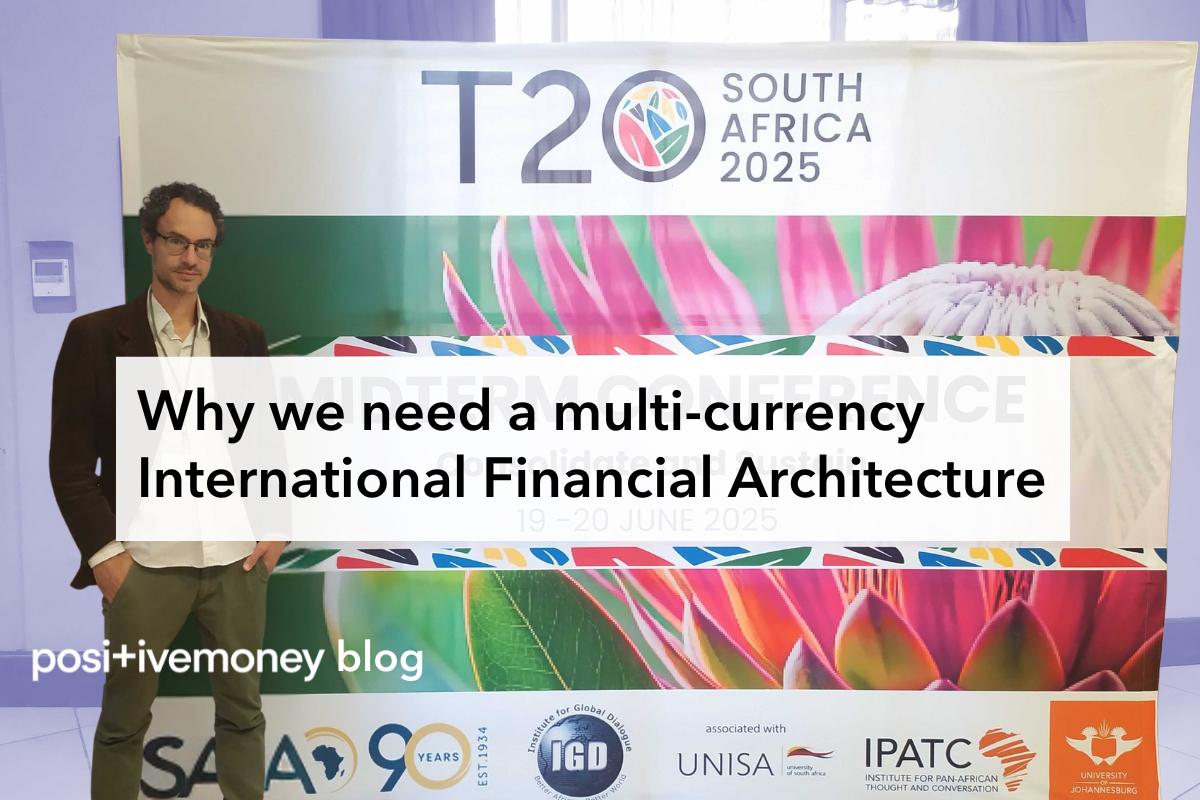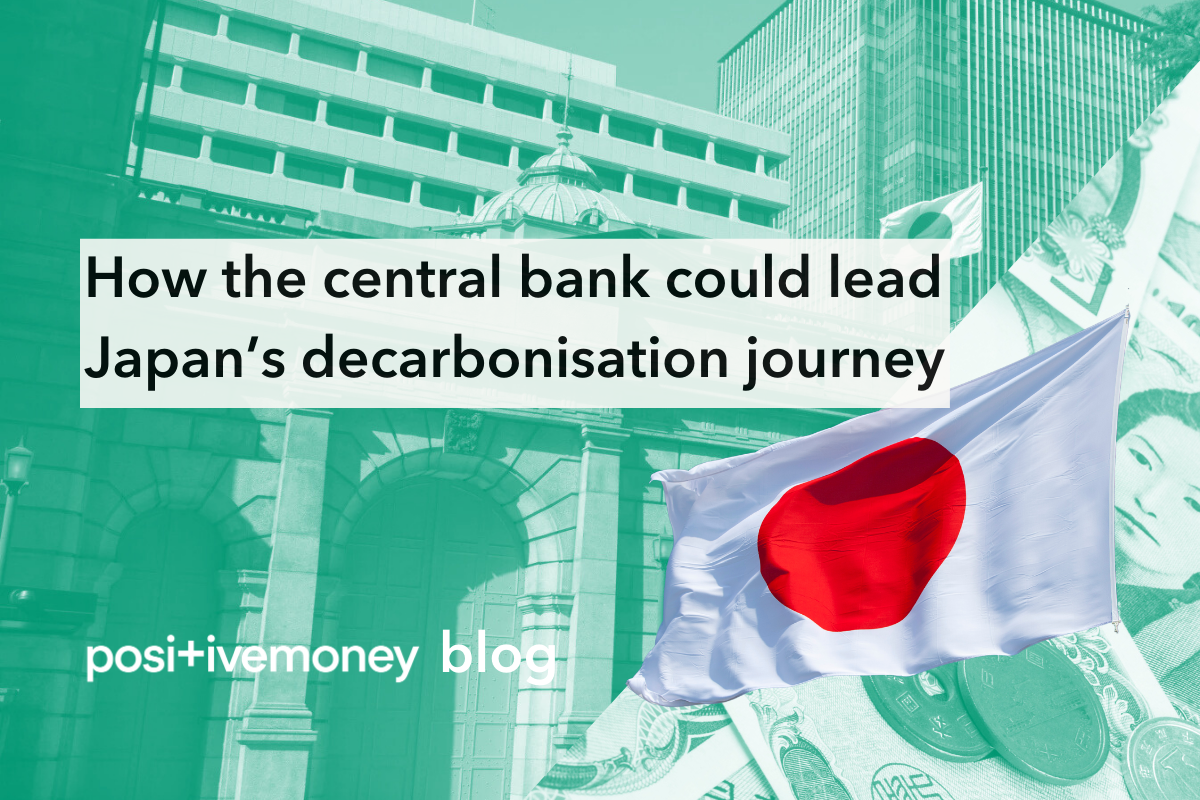
EUUK
3 July 2025
As a G7 member and Asia's most developed economy, Japan is uniquely positioned to lead the fight against climate change. However, the country’s efforts are being hindered by a lack of clear definitions for "green" and "transition" finance, while falsely clinging to market neutrality.
This article is part of a our ongoing series exploring green central banking in East Asia.
As one of the most developed countries in Asia and the world economy, Japan is expected to lead the battle against climate change as a G7 and G20 member. However, Japan has yet to unfold its full potential due to a lack of clear definitions of “green” and “transition”, and an underdeveloped sense of agency to proactively tackle climate change - scoring a miserable ‘C-’ in our recent 2024 Green Central Banking scorecard.
Japan declared its commitment to carbon neutrality in October 2020. Shortly after, the Bank of Japan (BoJ) announced its Strategy on Climate Change, promising to tackle climate change. However, after three years, the strategy’s efforts have not resulted in significant outcomes for the environment and the global climate crisis.
The BoJ is in charge of monetary policy in Japan and has two mandates: 1) price stability and 2) financial system stability. Since climate change poses significant risks to both, supporting tackling climate change is one of the strategies used to meet the mandates. The BoJ’s policy board manages monetary policy, and the policy board members are appointed by the cabinet. The comprehensive revision of the Bank of Japan Act in 1997 enhanced the BoJ's independence and transparency, with the stated aim of ensuring greater accountability to Japanese citizens.
The BoJ has independence in its day-to-day operations and use of policy instruments, but this does not mean independence from the government’s expectations and policies. In fact, the BoJ’s 2% inflation target was set in a joint statement with the government. While regarding climate change, the Japanese government has continue to emphasis the need for coal power plants and has not set a deadline to phase them out. Such poor national climate policies are likely to restrict the effectiveness of the BoJ’s green financing strategies due to the lack of strong initiatives for decarbonisation and robust standards to attract green finance.
The BoJ established some measures to tackle climate change through its monetary policy and market operations. However, they have not yet fully utilised their climate action potential partly because of the BoJ’s inadequate policy, but also because the Japanese government and industry are clinging to the status quo of emission-intensive industries.
Firstly, our 2024 Green Central Banking Scorecard revealed how the BoJ is failing to operate its fund-provisioning programme by not effectively promoting credible transitions despite the great potential to bring significant impacts. The programme was established based on the BoJ’s acknowledgement that supporting the private sector’s efforts on climate change via a new fund-provisioning programme aligns with its mandate for price stability. The programme is to invest in 1) green loans and/or bonds, 2) sustainable-linked loans and/or bonds, and 3) transition finance. However, the BoJ does not define what is eligible for investment, and private financial institutions are given control over the definition of “green” or “transition”.
The BoJ made it clear that they avoid direct involvement in micro-level resource allocation from a market neutrality perspective. However, the central bank's commitment to market neutrality hampers the transition to a green economy because it fails to recognise the urgency of addressing climate change through the lens of double materiality. Without actively shifting finance away from carbon-intensive sectors toward greener alternatives, this market neutrality prolongs the dominance of carbon-heavy industries.
There are also concerns about leaving the definition of credible transition activities up to private financial institutions. One of the Japanese major banks, Sumitomo Mitsui Financial Group (SMFG), published “Transition Finance Playbook 2.0” in 2024, and it includes gas exploration and production (only when the offtake is in Japan), gas power plants, ammonia/hydrogen co-firing, carbon capture and storage (CCS), etc. Another top bank, Mitsubishi UFJ Financial Group (MUFG), is also promoting ammonia co-firing and CCS for the Asian power sector, which has been criticised for prolonging the usage of fossil fuels and derailing green transition.
These examples indicate the danger of leaving the definition of credible transition activities up to private financial institutions. The BoJ must accept that market neutrality is an unachievable and unhelpful concept, and instead adopt a rigorous taxonomy for what qualifies as a transition activity.
Another issue concerns the Japanese government’s Climate Transition Bonds (CTBs). In February 2024, the Japanese government issued the world’s first sovereign CTBs, which the BoJ qualified for its market operations and asset purchasing programmes. The BoJ owns more than 40% of the total issued CTBs.
Due to Japan’s reliance on manufacturing and imported fossil fuels, Japan is taking a different approach to some other major economies regarding sustainable finance, focusing on transition and avoiding the dichotomy of “green” or not. Japan’s Ministry of Economy, Trade and Industry emphasises the need for transitional technologies. However, the Japanese government’s CTBs have been criticised by environmental NGOs, think tanks, and investor groups for their inclusion of unproven technologies that are uncertain of contributing to decarbonisation and even risk of greenwashing.
As a major purchaser of the CTBs, it is essential for the BoJ to monitor the use of proceeds carefully to avoid becoming an enabler of delays in a credible transition through greenwashing and carbon lock-in.
Lastly, lacking robust ESG criteria for its market operation and asset purchase programme poses a significant risk for the BoJ. The BoJ holds Japanese equities of approximately 37 trillion Japanese yen, or $248 billion in value via exchange-traded funds (ETFs), which comprise 4.9% of the BoJ’s total portfolio. This is bigger than the total assets under management of the top three Japanese asset managers. However, the BoJ has no environmental criteria for its asset purchase program.
The ETF is tracking the Tokyo Stock Price Index (TOPIX). Based on research, the ETF is exposed to approximately 8.5% of fossil fuel-related companies. The top 10 companies for the component weight of TOPIX include Toyota, MUFG and SMBC (which are some of the largest funders of fossil fuel expansion). Without clear and concrete measures, the portfolio - which is entrusted by the public to the BoJ - will continue to direct finance into harmful and high-polluting sectors.
To meet the scale of the climate challenge, the BoJ should develop a clear, standardised taxonomy defining "green" and "transition" finance to ensure the effectiveness of the fund-provisioning programmes, particularly around carbon-intensive activities like gas power, ammonia co-firing, and CCS, to prevent prolonged reliance on fossil fuels and delaying the transition. Defining eligible activities will enhance credibility, ensuring funds are directed toward genuine decarbonisation efforts.
The BoJ can also refine its asset purchase strategy to support decarbonisation by prioritising ETFs and indices with robust ESG criteria, focusing on sectors contributing to green transition. Establishing criteria for asset purchases should prioritise investments in low-carbon and renewable energy sectors, while phasing out assets with high greenhouse gas emissions. This would enhance the BoJ’s effort to support decarbonisation by influencing private capital flows towards climate-positive sectors, setting a benchmark for market participants, and safeguarding BoJ’s portfolio against climate-related economic disruptions.
The BoJ is not the only influential actor in green finance in East Asia, but it has a significant role in signalling and paving the road for a credible transition. A more strategic, climate-focused approach from BoJ would not only bolster Japan's transition to a decarbonised economy but also set a powerful precedent for green finance across Asia and beyond.
This article is part of our ongoing series exploring green central banking in East Asia.
_
Kentaro Nunokawa is a campaign fellow at Positive Money and full-time Japan Energy Campaigner at Market Forces. Ken has been actively involved in climate campaigns in Japan with particular focus on engagement with Japanese corporations, financial institutions, and investors. Ken holds a degree in Arts and Sciences, majoring in Peace Studies, from International Christian University and an MA in Political Ecology from Universitat Autònoma de Barcelona.
Sign-up to our mailing list for regular updates, or donate to support our work to redesign our economic system for social justice and a liveable planet.
